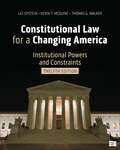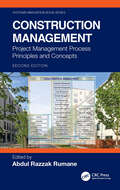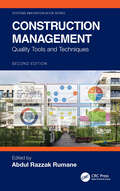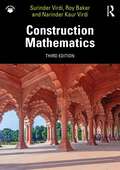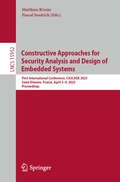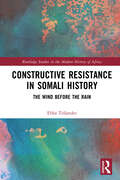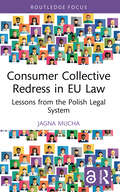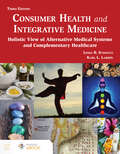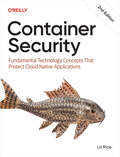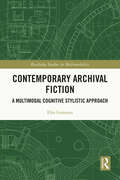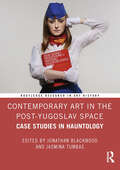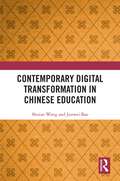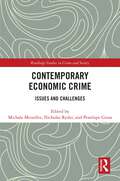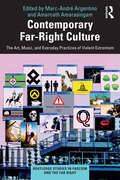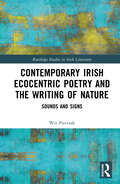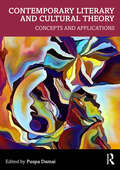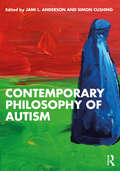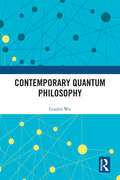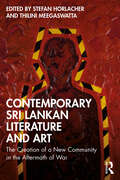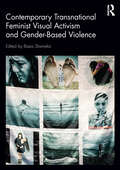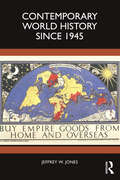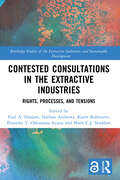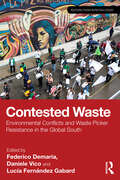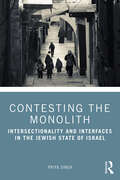- Table View
- List View
Constitutional Law for a Changing America: Institutional Powers and Constraints (Constitutional Law for a Changing America)
by Kevin T. McGuire Lee J. Epstein Thomas G. WalkerIn Constitutional Law for a Changing America: Institutional Powers and Constraints, bestselling authors Lee Epstein, Kevin T. McGuire, and Thomas G. Walker show students how political factors influence judicial decisions and shape the development of constitutional law. The Twelfth Edition, updated with additional material such as recent court rulings, more than 500 supplemental cases, and greater coverage of executive, legislative, and judicial power, facilitates a deeper understanding of how the U.S. Constitution defines what institutions can and cannot do. This book is ideal for Constitutional Law courses in the two-semester sequence that covers powers and constraints. For courses that cover both rights and liberties and the separation of powers in one semester, see Constitutional Law for a Changing America: A Short Course.
Constitutional Law for a Changing America: Institutional Powers and Constraints (Constitutional Law for a Changing America)
by Kevin T. McGuire Lee J. Epstein Thomas G. WalkerIn Constitutional Law for a Changing America: Institutional Powers and Constraints, bestselling authors Lee Epstein, Kevin T. McGuire, and Thomas G. Walker show students how political factors influence judicial decisions and shape the development of constitutional law. The Twelfth Edition, updated with additional material such as recent court rulings, more than 500 supplemental cases, and greater coverage of executive, legislative, and judicial power, facilitates a deeper understanding of how the U.S. Constitution defines what institutions can and cannot do. This book is ideal for Constitutional Law courses in the two-semester sequence that covers powers and constraints. For courses that cover both rights and liberties and the separation of powers in one semester, see Constitutional Law for a Changing America: A Short Course.
Construction Management: Project Management Process Principles and Concepts (Systems Innovation Book Series)
by Abdul Razzak RumaneManagement process groups along with the processes in the knowledge areas having to do with the principles and concepts used in the development of major construction activities are very important in the overall construction management process. This volume covers the application of these activities that manage the construction project from inception through to the completion of the construction project.Construction Management: Project Management Process Principles and Concepts discusses the five elements of management functions which include planning, organizing, staffing, directing, and controlling, and explains how these activities/elements of management functions can be used in construction projects. Information about strategic planning, operational planning, intermediate planning, and contingency planning, and the steps involved with relevance to construction projections is offered in this volume. The different types of organizational structures, such as simple, functions, divisional, matrix, team-based, network, and modular, with an example organizational chart, are presented. Also covered are staffing processes such as acquisition, roles and responsibilities, assessment, team building, training, and development, along with directing and controlling elements of the management functions. This volume is rounded out with the inclusion of the five types of management processes, such as initiating, planning, executing, monitoring, controlling, and closing, along with applicable knowledge areas based on the PMBOK® methodology.This volume provides significant information and guidelines to construction and project management professionals (owners, designers, consultants, construction managers, project managers, supervisors, contractors, builders, developers, and many others from the construction related industry) involved in construction projects (mainly civil construction projects, commercial A/E projects) and construction related industries.
Construction Management: Quality Tools and Techniques (Systems Innovation Book Series)
by Abdul Razzak RumaneThe application of quality tools and techniques in construction projects has a great influence on the cost-effectiveness results of construction projects and achieving successful project performance. Quality management tools and techniques help in project planning, execution, monitoring, and control of the project and evolve a project management system that makes project deliverables.Construction Management: Quality Tools and Techniques provides the usage and application of various quality tools and techniques in different phases of construction project management focusing on three quality management processes involving the varying aspects of quality. This volume illustrates how important quality is for construction projects and offers an overview of construction projects along with a brief introduction to the different types of projects, the different phases of the life cycle, and the principles. Project Delivery Systems (PDS) along with their organizational relationship, participants, advantages, and disadvantages of each system are included. The book goes on to discuss the qualification of construction managers and the type of management systems and their roles during the different design stages from the beginning through to the handover of the project is also included.This volume provides significant information and guidelines to construction and project management professionals (owners, designers, consultants, construction managers, project managers, supervisors, contractors, builders, developers, and many others from the construction-related industry) involved in construction projects (mainly civil construction projects, commercial-A/E projects) and construction-related industries.
Construction Mathematics
by Surinder Virdi Roy Baker Narinder Kaur VirdiConstruction Mathematics is an introductory-level mathematics text, written specifically for students of construction and related disciplines.The third edition of this popular textbook is fully updated to match new curricula, including the new T Levels and expanded to include three new chapters on Differentiation, Integration, and Maximum and Minimum. End-of-chapter exercises cover a range of theoretical and practical problems commonly found in construction practice, and an end of unit test based on practical tasks gives students the opportunity to apply all the knowledge they have gained. Key benefits of the new edition include: Students learn by tackling exercises based on real-life construction maths. Examples include calculating costs of labour and materials, and setting out of building components using geometry and trigonometry Suitable for beginners and easy to follow throughout with a handy revision guide for more advanced students Students will learn the essential basic theory along with the practical necessities. Construction Mathematics addresses all the mathematical requirements of Level 2 construction NVQs and the BTEC Level 1/Level 2 Tech Award in Construction and the Built Environment as well as the T Level Design, Surveying and Planning. It is also the ideal primer for any reader who wishes to refresh their mathematics knowledge whilst studying a construction-related HNC or BSc.
Constructive Approaches for Security Analysis and Design of Embedded Systems: First International Conference, CASCADE 2025, Saint-Etienne, France, April 2–4, 2025, Proceedings (Lecture Notes in Computer Science #15952)
by Matthieu Rivain Pascal SasdrichThis book constitutes the refereed proceedings of the First International Conference on Constructive Approaches for Security Analysis and Design of Embedded Systems, CASCADE 2025, held in Saint-Etienne, France, during April 2–4, 2025.The 24 full papers included in this book were carefully reviewed and selected from 51 submissions. They are organized in topical sections as follows: Attacks on Symmetric Cryptography; Side-Channel Attacks; Physical Security; RISC-V; Machine Learning; Attacks on Post-Quantum Cryptography; Securing Post-Quantum Cryptography; Homomorphic Encryption and White-Box Cryptography; Attacks on Symmetric Cryptography; Side-Channel Attacks; Physical Security; RISC-V; and Machine Learning.
Constructive Resistance in Somali History: The Wind Before the Rain (Routledge Studies in the Modern History of Africa)
by Ebba TellanderIn the 1980s, the arrests of a group of teachers, doctors, and other professionals triggered a wave of protests – the first open resistance against Siad Barre’s regime in northern Somalia – helping to pave the way for Somaliland’s self-declaration in 1991. This book provides an extensive analysis of that transformative moment, drawing on over 100 oral histories and archival materials, including trial protocols and political poetry.This fascinating case study demonstrates how resistance that is constructive, non-violent, and caring can spark collective action and change. In 1981–1982 in northern Somalia, doctors, teachers, and other professionals came together to restore a hospital and to volunteer in schools as acts of resistance towards state oppression. Their arrest sparked the first open street protests against Siad Barre’s dictatorship. It is an inspiring story in which collective acts of care and community mobilization ultimately led to societal change in an oppressive setting, in a region more known for its violence and fragmentation. The book takes the case further by combining theories in innovative ways, providing a compelling account of political socialization and non-violent civil resistance in repressive settings.Richly supported with 19 illustrations, this important case study will be of interest to researchers working on African history, or politics and resistance studies more broadly. Readers can see a short film developed about the life stories of the Uffo group here: https://positivenegatives.org/story/transform/somaliland/
Consumer Collective Redress in EU Law: Lessons from the Polish Legal System (Routledge Research in EU Law)
by Jagna MuchaThis book provides critical insights into the framework of consumer collective redress within EU law, including recent changes introduced by the Representative Actions Directive (EU) 2020/1828. The focus is on Poland, where group proceedings have been operating since 2009. The exploration of Poland’s 15-year time-span experience constitutes a comprehensive case study, offering valuable examples and recommendations.The study examines whether, collective redress mechanisms can ensure effective enforcement of consumer rights and, at the same time, guarantee a high level of consumer protection. The discussion is composed of three fundamental parts. The first chapter explores the nature of collective redress from the perspective of EU law. In the second chapter, the book addresses the various legal mechanisms operating in the Member States and the UK that serve consumers as means of collective redress. The final chapter focuses on Poland, discussing the legislative framework and functioning of group proceedings in practice. The discussion is enriched with specific solutions for the further development of collective redress in the EU.This book covers issues that will be of interest to researchers investigating EU consumer law, collective redress, class actions and law enforcement more in general. It will be of relevance to consumers and practicioners, including attorneys and consumer organisations aiming to bring representative actions in one of the EU Member States.
Consumer Health and Integrative Medicine, Third Edition
by Linda Baily Synovitz Karl L. LarsonToday, being a health consumer encompasses more than being knowledgeable about traditional medicine and health practice; it also requires one to be well-informed about the expanding field of complementary and integrative health and healthcare. Consumer Health and Integrative Medicine: A Holistic View of Alternative Medicine Systems and Complementary Health Care expands upon the many alternative modalities that other consumer health texts overlook. It includes chapters on major alternative medicine systems and healing modalities, including Ayurvedic medicine; traditional Chinese medicine; naturopathic and homeopathic medicine; mind-body interventions; energy therapies; botanicals; aromatherapy and essentials oils; and manipulative and body-based therapies. The authors' mission is to help readers increase their knowledge base and become informed consumers. New research and statistics regarding the various complementary and alternative methodologies. Three New Chapters: Native American Medicine and Healing Traditions (8), Kampo Medicine of Japan (11), and Traditional Arabic and Islamic Medicine (TAIM) (12)Changes in terminology to comply with updated National Center for Complementary and Integrative Health (NCCIH) terminologyNew information on the cost of health care in the U.S. as compared with other advanced countries, including prescription drug prices.Added content on health product advertising practices, including internet-based and social media advertising.Discussion of how consumers can protect their rights and more detailed information on current types of fraud. Consumer HealthAlternative & Complementary HealthcareIntegrative Health/MedicineHolistic Healing/Health/Medicine © 2026 | 350 pages
Container Security: Fundamental Technology Concepts That Protect Cloud Native Applications
by Liz RiceAs containerized and cloud native applications become foundational to modern software infrastructure, the need for a deep, conceptual understanding of their security implications has never been more urgent. Container Security, second edition, offers a rigorous yet practical examination of the technologies that underpin container platforms—equipping developers, operations professionals, and security practitioners with the mental models needed to evaluate risk and enhance resilience. Written by Liz Rice, a recognized authority in cloud native security, this updated edition builds on the foundational principles from the first edition while incorporating today's evolving threat landscape, modern tooling, and advancements in platforms like Kubernetes and Linux. Readers will gain a firm grasp of the architectural components behind containers and the Linux primitives that support them, fostering a systems-level understanding of both threats and mitigation strategies. Examine the technical underpinnings of containers through a security-focused lens Evaluate evolving risks and defenses across container runtimes and orchestration platforms Analyze the implications of modern tooling including eBPF and AI-driven approaches Apply core principles to assess and secure real-world deployments in dynamic environments
Contemporary Archival Fiction: A Multimodal Cognitive Stylistic Approach (Routledge Studies in Multimodality)
by Elin IvanssonThis book presents a synthesised framework for analysing archival poetics in multimodal literature, examining case studies from twenty-first-century American fiction towards elucidating the archival turn in contemporary literature more broadly. Ivansson turns her focus on multimodal archival fiction, here understood as works which engage with archival practices of collecting and organising both verbal text and visual inclusions of fictional and factual archival material, such as photographs, sketches, notes, and newspaper clippings.The volume brings together work from multimodality, cognitive stylistics, and narratology with archival studies to demonstrate how contemporary archival fiction engages with archival themes through multimodal design. Case studies include works from Barbara Hodgson, Leanne Shapton, Valeria Luiselli, and Jacob Garbe and Aaron A. Reed. The selected examples allow for a detailed exploration of how to analyse the multimodal composition and reader experience of archival poetics. Furthermore, these case studies also elucidate how such a framework can be applied more broadly to the analysis of fictional works thematically and structurally concerned with the archive, or those that grapple with such areas of interest in contemporary research as materiality, bookishness, and ontological ambiguity.This volume will appeal to students and scholars in multimodality, stylistics, American literature, and literary studies.
Contemporary Art in the Post-Yugoslav Space: Case Studies in Hauntology (Routledge Research in Art History)
by Jasmina Tumbas Jonathan BlackwoodThis edited volume is centered on the production, discussion, and consumption of contemporary art in the post-Yugoslav space now. Authors in this volume demonstrate how and why contemporary art discourses have continued to overcome chronic difficulties in local cultural economies since the dissolution of the common federal space of socialist Yugoslavia.This book focuses on socialist Yugoslavia’s prevailing cultural legacies of anti-fascism, non-alignment, queer and feminist movements, and socially engaged art, which inform and shape contemporary critiques of neoliberal capitalist conditions in the arts. Chapters are rooted in ongoing global challenges in contemporary art: a universal exhaustion through over-work (on the part of the artist/art worker) and over-stimulation (the audience); the structural weakness of contemporary art as a set of institutional activities; and the instrumentalization of art.The book will be of interest to scholars working in art history, contemporary art, gender studies, Slavic studies, politics, and post-conflict studies.
Contemporary Digital Transformation in Chinese Education
by Shutao Wang Junwei BaoAdopting a macro‑meso‑micro framework, this book explores the recent developments of digital transformation in Chinese education.From a macro perspective, this book examines the sociocultural background and policy environment of China’s educational digital transformation. At the meso level, it analyzes the dynamics and challenges of educational digitalization within the context of regional equity. Finally, it examines the impact of digital technologies on school practices at the micro level. By delving into the driving forces behind the digital transformation of education in China, and assessing its empowerment of regional equity and its impact on educational practices, this book will provide theoretical and practical support for future educational reforms and offer insights into the digital transformation of education in other developing countries.This book will attract academic researchers of educational technology and policy, policymakers, and educational administrators.
Contemporary Economic Crime: Issues and Challenges (Routledge Studies in Crime and Society)
by Nicholas Ryder Michala Meiselles Penelope GiosaThis edited collection explores the culpability of corporate bodies and international organisations and examines the different responses to economic offences such as money laundering, bribery and corruption, cybercrime, market manipulation, insider trading and market abuse. In a world where corporations wield legal personhood, the legal intricacies of corporate criminal liability come to the forefront. While national and international lawmakers attempt to rein in corporate power, the ever‑evolving landscape demands a re‑evaluation of the current normative framework.The heart of this book lies in its dual mission – firstly, to compare the different jurisdictional approaches to crimes committed by corporations, and secondly, to propose solutions to some of the challenges faced by lawmakers, policymakers and law enforcement. Expert contributors embark on a global journey from North America to the Asia Pacific via Europe, from Common Law jurisdictions to Civil Law ones, unravelling the diverse approaches to corporate and institutional crime. The challenges facing lawmakers, policymakers and law enforcement are explored throughout this book, alongside solutions to the complex issues they face, whether this involves money laundering, bribery and corruption, fraud, cybertrafficking and corporate involvement in human rights violations.Contemporary Economic Crime: Issues and Challenges is an indispensable resource for anyone captivated by the dynamic dominion of white‑collar and corporate wrongdoing. It will be of interest to academics, legal practitioners, lawmakers, policymakers and law enforcement navigating the complex terrain of financial and corporate crime.
Contemporary Far-Right Culture: The Art, Music, and Everyday Practices of Violent Extremism (Routledge Studies in Fascism and the Far Right)
by Marc-André Argentino Amarnath AmarasingamContemporary Far-Right Culture offers a comprehensive overview of the varied manifestations of today’s far-right culture. It examines how far-right extremists operate in the spaces they inhabit, exploring the key elements, characteristics, and historical background of far-right extremism. The volume also considers who produces and who consumes this culture, featuring contributions from emerging scholars in the field.Chapters investigate the cultural output of far-right influencers in anime, podcasts, “fashwave” and white power music, gaming, memetic and visual culture, social media, publishing, chan culture, philosophy, and martial arts. The book further examines pivotal issues such as female far-right influencers, paranoia, and accelerationism. It is essential reading for scholars, researchers, and activists interested in the contemporary far right and its subcultures.
Contemporary Irish Ecocentric Poetry and the Writing of Nature: Sounds and Signs (Routledge Studies in Irish Literature)
by Wit PietrzakContemporary Irish Ecocentric Poetry and the Writing of Nature explores how poetic language can apprehend non-anthropocentric points of view. It builds on the recent developments in environmental humanities and seeks to show that four Irish poets, Derek Mahon, Paula Meehan, Moya Cannon and Seán Lysaght, offer means of diversifying our perception of nature and our place in it. This diversification, in turn, is intended to help us change our idea of natural environment from seeing it as a passive space, which we can either exploit or preserve, to a view of nature as an interrelated network of agents, in which humans are one actor among numerous others. Utilising a broad theoretical and philosophical context to help frame the analyses of verse in up-to-date conceptual schemes, this volume serves as a critical foundation for the future work and research in Irish ecocriticism and on ecopoetics in general, making the monograph an ideal read for postgraduates, scholars and researchers in these fields.
Contemporary Literary and Cultural Theory: Concepts and Applications
by Puspa DamaiContemporary Literary and Cultural Theory: Concepts and Applications introduces major critical and literary theories to undergraduate and postgraduate students.Key features include: Comprehensive coverage: Includes major theoretical schools such as Formalism, New Historicism, Structuralism, Post-Structuralism, Marxism, Feminism, and more. Focus on contemporary topics: Explores cutting-edge areas like Digital Humanities, Glitch Theory, Disability Theory, Affect Theory, Dalit Studies, Trauma Theory, and Animal Studies. Accessible language: Written in a clear, reader-friendly style ideal for both native and non-native English speakers. Student-friendly approach: Makes complex theoretical ideas engaging and understandable, enhancing both reading and application skills. Updated theoretical debates: Discusses recent developments, including debates around the concept of "post-theory." Versatile usage: Suitable for courses in literature, cultural studies, and interdisciplinary humanities programs. This volume is an essential companion for students, researchers, and instructors seeking a thorough and accessible guide to contemporary literary and cultural theory.
Contemporary Philosophy of Autism
by Simon Cushing Jami L. AndersonThis volume explores interesting and emerging philosophical questions related to autism. It sheds light on the ways in which cultural attitudes about autism have changed in the decade since the editors published their first volume on the philosophy of autism.So much about autism has changed in the last decade. Cultural attitudes about autism are far more nuanced. Self-identification as autistic has exploded, as have discussions of the political and social implications for being an out autistic person. This volume approaches a wide range of issues that autism raises in social and political theory, ethics, philosophy of social science, epistemology, metaphysics, and law. The issues addressed include moral responsibility, autism and gender, knowledge acquisition, the double empathy problem, social cognition, vulnerability in interpersonal communication, masking, the neurodiversity movement and destigmatization, and the effectiveness of ABA therapy. Each of the contributors, many of whom self-identify as autistic, has a personal connection with autism.Contemporary Philosophy of Autism will appeal to researchers and graduate students working in philosophy of mind, philosophy of cognitive science, epistemology, philosophy of medicine, and disability studies. It will appeal to those working in other academic fields such as developmental psychology, neuropsychology, cognitive psychology, and education.
Contemporary Quantum Philosophy
by Guolin WuFollowing the first and second quantum revolutions, quantum information theory has expanded beyond the field of physics into numerous other interdisciplinary areas. This book provides a comprehensive philosophical exploration of quantum mechanics and quantum information.The author examines key concepts such as quantum reality, quantum entanglement, quantum information, the quantum world, quantum computing, and quantum matter, while also extending quantum mechanical theory to encompass phenomenology, hermeneutics, and trans- empirical philosophy. Drawing on Kant’s transcendental idealism and neo- Kantianism, the author introduces the concept of “trans-empirical”— that which transcends experience without abandoning it and which, in fact, enables it. The book skillfully demonstrates how trans- empirical reality and cognition offer valuable analytical frameworks for contemporary quantum philosophy.This work will appeal to scholars and graduate students in various disciplines, including the philosophy of science and technology, analytical philosophy, the philosophy of language, phenomenology, and hermeneutics.
Contemporary Sri Lankan Literature and Art: The Creation of a New Community in the Aftermath of War
by Stefan Horlacher Thilini MeegaswattaThis volume brings together art, literature, and critical analyses to examine which concepts and blueprints of (re-)negotiation of national, ethnic and religious identities may pave the way towards a more inclusive yet open and plural Sri Lankan society. It looks to develop new, creative, and alternative concepts of community and nation-building as envisaged in Sri Lanka’s rich contemporary art scene, i.e. literature, theatre, film, and performing and visual arts. The individual chapters authored by prominent academics as well as renowned artists critically engage with a pertinent selection of contemporary Sri Lankan works of art and their visions of what a multi-ethnic, multi-religious Sri Lanka might look like in the aftermath of three decades of war, a severe economic crisis and the tenacious protests of 2022 (Aragalaya).The first of its kind, this volume includes analyses ranging from disciplines such as Anthropology, Literary and Cultural Studies, Film and Performance Studies, South Asian Studies and Art History to topics such as the question of truth in testimonial literature, Buddhist nationalism, Sinhala identity politics and the (im)possibility of transitional justice. It is supplemented with interviews and unpublished short stories and poetry from well-known resident and diasporic Sri Lankan writers as well as art originating from the Aragalaya.
Contemporary Transnational Feminist Visual Activism and Gender-Based Violence
by Basia SliwinskaThis book illuminates arts activist interventions that raise consciousness and advocacy for women’s right to a life free from violence.In a context where gender-based violence (GBV) has continued to intensify across the globe, the international range of essays focuses on violations of bodily integrity and autonomy, reproductive, domestic and sexual violence, femicide and feminicide. Comparing and interrogating arts activist strategies and visual methods, the book also explores tactics employed by arts activists attentive to effects and lived experiences of GBV, and imagining potential solutions founded in feminist thinking to change behaviours and raise awareness generating systemic change. The case studies of feminist transnational contemporary arts activism include examples from Australia, Austria, Brazil, Canada, Croatia, Ghana, Guatemala, Hong Kong, Iraq, Japan, Kuwait, Mexico, Nepal, Poland, South Africa and the United States. Arts engaged include textile work, crafts-making, performance art, clay work, protest art, and documentary art, indicating the breadth and richness of the work of feminist political artists. At a time when, according to the UN Women’s estimates, almost one in three women has been subjected to violence, it is critical to understand how feminist politics catalyses social, cultural, and political changes.This book will be of interest to scholars working in art history, women’s studies, gender studies, and visual culture.
Contemporary World History Since 1945
by Jeffrey W. JonesThis book introduces readers to the historical roots of the key events, issues, and themes in the post-World War II period since 1945.Organized by region—Europe, Asia, the Middle East, Africa, and Latin America—it uses case studies to emphasize common themes and patterns. The book argues that the colonial period largely shaped the primary global relationships that still hold in the world today. During and after de-colonization, the Cold War emerged as the dominant global paradigm, but following the collapse of communism, a neo-liberal capitalist agenda prevailed in much of the world, although that has in turn shifted due to the global financial crisis of the late 2000s/early 2010s. The book explores these themes as well as terrorism and the environmental degradation of the planet which are major features of the post-Cold War world, along with racial/ethnic/religious diversity and conflict, democracy, human rights, nationalism, and gender relations.This volume is an essential resource for students of Contemporary World History, the World Since 1945, and the World in the Twentieth Century more broadly.
Contested Consultations in the Extractive Industries: Rights, Processes, and Tensions (Routledge Studies of the Extractive Industries and Sustainable Development)
by Paul A. HaslamThis volume examines how communities, companies, and governments contest and contribute to the evolution of norms, rules and decision-making procedures that govern stakeholder consultation in the extractive industries. In recent years international organisations, governments and companies around the world have dramatically reformed the regime that governs consultations with community stakeholders about proposed extractive projects. However, the characteristics of this consultation regime are often contested, with diverse stakeholders seeking to defend their interests by drawing on different authoritative interpretations of the rules, norms and decision-making procedures that govern stakeholder consultation. Contestation over the meaning, governance and practice of stakeholder consultation is the central thread that ties this book together. Within this overarching concern, the volume takes a global and comparative perspective that examines the complexity of these intersecting and overlapping consultation requirements, with a particular focus on Indigenous Peoples, using cases from the Global North and Global South, including Argentina, Australia, Brazil, Canada, The Central African Republic, The Democratic Republic of Congo, Iceland, Ghana, Greenland, Guyana, Norway, and Peru. The book highlights the tensions associated with the application of this contested regime and identifies possible solutions from best practices around the world. From a theoretical perspective the book unpacks the maze of overlapping consultation requirements and practices that highlights the normative disagreements between key stakeholders and the overlapping rules and procedures that govern the implementation of consultation. A unique contribution of this collection is the commentary from practitioners, who reflect on the same issues addressed by the academic contributors, but based on their own vast practical experience.This book will be of great interest to students and scholars researching public participation and stakeholder consultation in the extractive industries as well as natural resource governance and sustainable development more broadly.
Contested Waste: Environmental conflicts and waste picker resistance in the Global South (Routledge Studies in Political Ecology)
by Federico Demaria Daniele Vico Lucía Fernández GabardContested Waste’ examines socio-environmental conflicts involving waste pickers in the Global South, uncovering the systemic injustices that underpin contemporary waste policies. Driven by the privatisation of waste management, these conflicts expose the “recycling paradox”: while waste pickers make critical, uncompensated contributions to sustainability, they are further excluded.This book analyses how modern waste policies marginalise waste pickers, triggering conflicts in cities across Africa, Latin America, and Asia. Drawing on over 70 conflicts documented in the Global Environmental Justice Atlas, the book explores how privatisation, incineration, and waste enclosures displace informal recyclers and worsen the sustainability crisis. These processes exemplify “Capital Accumulation by Dispossession,” as waste streams are enclosed and privatised, excluding waste pickers, and “Capital Accumulation by Contamination,” as environmental burdens are shifted onto marginalised communities. The book also showcases waste pickers’ resilience as they organise to fight for justice and equitable waste systems.Essential for scholars, policymakers, and activists in environmental justice, development, and urban studies, this book reveals the structural drivers of waste conflicts and the transformative power of grassroots resistance in shaping sustainable and inclusive urban futures.
Contesting the Monolith: Intersectionality and Interfaces in the Jewish State of Israel
by Priya SinghThe book challenges the notion that Israel is a homogeneous state, whether in theory or in practice. It offers a detailed and critical intersectional analysis of nationalism, ethnicity, gender and marginality in Israeli society, revealing how these forces converge to produce multiple as well as fused identities within a complex social fabric. Examining the ruptures and fault lines that shape a multi-layered society, the study contends that Israel’s exceptionality lies not in its self-proclaimed “Jewish and democratic” character, but in its resort to exceptional legal and coercive measures to mask internal diversity. By obscuring this heterogeneous reality, the state cultivates an illusion of a monolithic and uniform Israeli identity. The analysis presents a society far more fragmented and stratified than official narratives suggest, offering readers an understanding of how intersecting structures of identity and power operate in the Israeli context, and how social and political institutions respond to and regulate internal difference. This book will be of interest to academic researchers, postgraduate and doctoral students and policymakers engaged with questions of nationalism, marginality, identity and Middle Eastern politics, particularly within the disciplines of political science, sociology, Middle Eastern studies and gender studies.
